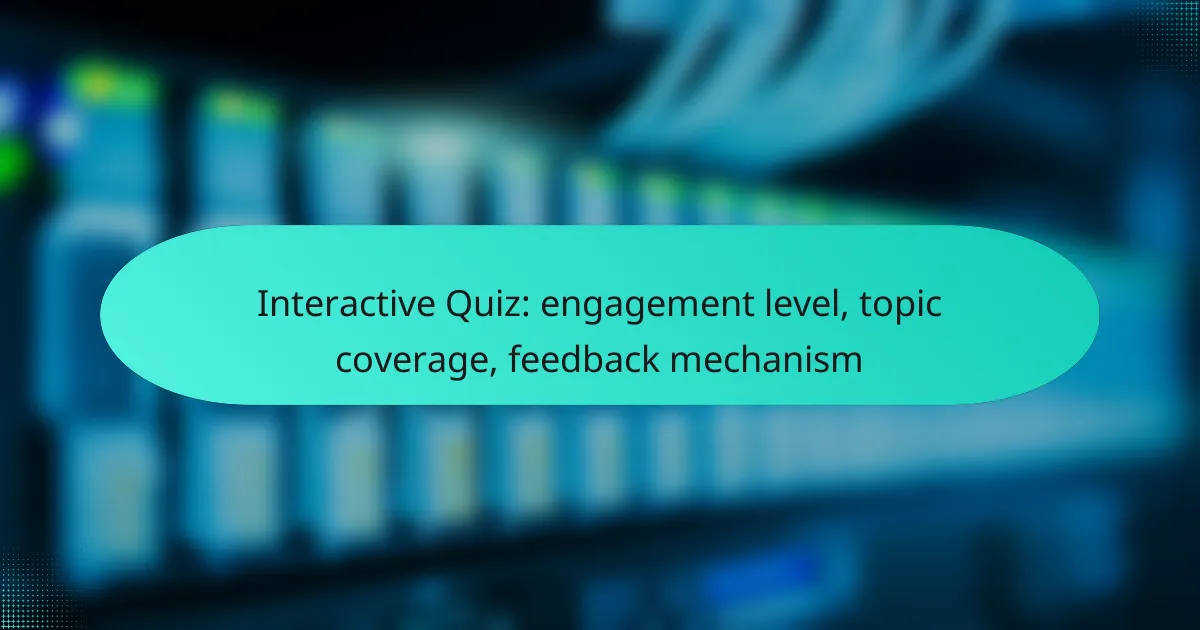Interactive quizzes are a powerful tool for enhancing user engagement by transforming passive learning into an active experience. By covering relevant and appealing topics, they resonate with audiences and encourage deeper interaction. Additionally, effective feedback mechanisms provide immediate responses, fostering a more personalized learning journey and helping users track their progress.

How can interactive quizzes enhance engagement in digital products?
Interactive quizzes significantly boost engagement by actively involving users in the learning process. They transform passive consumption into an engaging experience, encouraging users to interact with content and retain information more effectively.
Increased user interaction
Interactive quizzes promote higher levels of user interaction compared to traditional content formats. By requiring users to answer questions or make choices, quizzes create a dynamic environment that keeps users engaged for longer periods.
For instance, a quiz that asks users to select their favorite topics can lead to tailored content recommendations, enhancing their overall experience. This active participation fosters a sense of ownership and investment in the material.
Personalized content delivery
Quizzes can tailor content to individual users based on their responses, making the experience more relevant. By analyzing user answers, digital products can deliver personalized recommendations or follow-up content that aligns with users’ interests and knowledge levels.
This personalization can significantly increase user satisfaction and retention, as users are more likely to engage with content that resonates with them. For example, a fitness app might suggest workout plans based on quiz results regarding fitness goals and preferences.
Real-time feedback collection
Interactive quizzes provide immediate feedback to users, allowing them to understand their performance and knowledge gaps. This instant feedback mechanism helps users learn and adjust their understanding on the spot, enhancing the educational value of the content.
For example, a quiz on a language learning platform can instantly show users which words they struggled with, prompting them to revisit those areas. This real-time interaction encourages continuous improvement and engagement.
Gamification elements
Incorporating gamification elements into quizzes can further enhance user engagement. Features like scoring, time limits, and badges create a competitive atmosphere that motivates users to participate actively.
For instance, a trivia quiz that awards points for correct answers and ranks users on a leaderboard can drive participation and encourage users to return for more challenges. This playful approach makes learning enjoyable and addictive.
Data-driven insights
Interactive quizzes generate valuable data that can inform content strategy and user experience improvements. By analyzing user responses and engagement patterns, organizations can identify trends and areas for enhancement.
For example, if a significant number of users struggle with specific questions, it may indicate that the content needs to be adjusted for clarity or difficulty. Utilizing these insights can lead to more effective content delivery and higher overall engagement rates.

What topics are best suited for interactive quizzes in the UK?
Interactive quizzes in the UK are most effective when they cover engaging and relevant topics that resonate with the audience. Popular areas include education, health, entertainment, and market research, each offering unique opportunities for interaction and feedback.
Education and training
Quizzes in education and training can enhance learning by providing immediate feedback and reinforcing knowledge. They are ideal for subjects like mathematics, history, and language learning, where users can test their understanding and receive instant results.
Consider incorporating various question types, such as multiple-choice, fill-in-the-blank, or true/false, to cater to different learning styles. This approach not only keeps users engaged but also helps identify areas needing improvement.
Health and wellness
Health and wellness quizzes can help individuals assess their lifestyle choices and knowledge about nutrition, fitness, and mental health. These quizzes can provide personalized feedback, encouraging users to make informed decisions about their well-being.
When designing health-related quizzes, ensure that the questions are clear and based on reputable sources. For example, quizzes on dietary habits can include questions about daily fruit and vegetable intake, helping users understand their nutritional needs.
Entertainment and lifestyle
Entertainment and lifestyle quizzes are popular for their fun and engaging nature, often focusing on topics like movies, music, and travel. These quizzes can spark interest and discussions among users, making them shareable on social media platforms.
To maximize engagement, consider using visually appealing formats and incorporating multimedia elements, such as images or videos. This can enhance the user experience and encourage participation.
Market research
Quizzes can serve as a valuable tool for market research, helping businesses gather insights about consumer preferences and behaviors. By asking targeted questions, companies can better understand their audience and tailor their products or services accordingly.
When using quizzes for market research, keep questions concise and focused on specific topics. Offering incentives, like discounts or entry into a prize draw, can increase participation rates and yield more comprehensive data.

How do feedback mechanisms work in interactive quizzes?
Feedback mechanisms in interactive quizzes provide immediate responses to users based on their answers, enhancing engagement and learning. These mechanisms can include instant scoring, tailored follow-up questions, and analytics to track user behavior and preferences.
Instant results and scoring
Instant results and scoring give users immediate feedback on their performance after completing a quiz. This not only boosts engagement but also helps learners identify areas for improvement. For example, a quiz might display a score out of 100 immediately after submission, allowing users to see how well they understood the material.
To optimize this feature, quizzes can use color-coded scoring systems, such as green for correct answers and red for incorrect ones, making it visually intuitive. Providing a brief explanation for each answer can further enhance understanding.
Follow-up questions based on responses
Follow-up questions adapt to users’ previous answers, creating a personalized learning experience. This approach can clarify misconceptions or deepen knowledge on specific topics. For instance, if a user answers a question incorrectly, the quiz may present a related question that addresses the misunderstanding.
To implement this effectively, quizzes should have a branching logic system that allows for dynamic question paths. This keeps users engaged and encourages them to think critically about their responses.
Analytics for user behavior
Analytics for user behavior track how participants interact with quizzes, providing valuable insights into engagement levels and content effectiveness. By analyzing metrics such as completion rates and average scores, educators can refine quiz content and structure to better meet learners’ needs.
Using tools like Google Analytics or built-in quiz analytics can help identify trends over time. For example, if a significant number of users struggle with a particular question, it may indicate a need for clearer explanations or additional resources on that topic.

What are the prerequisites for creating effective interactive quizzes?
Creating effective interactive quizzes requires a clear understanding of objectives, target audience, and the relevance and quality of content. These elements ensure that quizzes engage users and provide valuable feedback.
Clear objectives and goals
Establishing clear objectives and goals is essential for any interactive quiz. Define what you want to achieve, whether it’s assessing knowledge, gathering feedback, or enhancing engagement. Specific goals help shape the quiz structure and content.
For example, if the goal is to evaluate knowledge retention, questions should focus on key concepts rather than trivial details. This alignment ensures that the quiz serves its intended purpose effectively.
Understanding target audience
Knowing your target audience is crucial for crafting relevant quizzes. Consider demographics such as age, education level, and interests to tailor content that resonates with participants. This understanding enhances engagement and encourages completion.
For instance, a quiz aimed at high school students should use relatable language and examples, while a professional development quiz might incorporate industry-specific terminology. Adjusting the tone and complexity based on the audience can significantly impact participation rates.
Content relevance and quality
The relevance and quality of content are vital for an effective interactive quiz. Ensure that questions are aligned with the objectives and are based on accurate, up-to-date information. High-quality content fosters trust and encourages users to engage meaningfully.
Consider using a mix of question types, such as multiple choice, true/false, and open-ended questions, to maintain interest. Regularly review and update the quiz content to reflect changes in the subject matter and keep it relevant for users.

What tools can be used to create interactive quizzes?
Various tools are available for creating interactive quizzes, ranging from simple online platforms to more advanced software. These tools enable users to design engaging quizzes that can enhance learning and gather feedback effectively.
Online Quiz Makers
Online quiz makers are user-friendly platforms that allow anyone to create quizzes without needing technical skills. Popular options include Google Forms, Typeform, and Quizlet, which offer templates and customization features. These tools typically support various question types, such as multiple-choice, true/false, and open-ended questions.
When selecting an online quiz maker, consider factors like ease of use, available features, and integration with other tools. Many of these platforms offer free versions with basic functionalities, while premium plans unlock advanced features like analytics and branding options.
Learning Management Systems (LMS)
Learning Management Systems (LMS) like Moodle and Canvas provide robust environments for creating quizzes as part of broader educational courses. These systems often include features for tracking student progress and performance, making them ideal for educational institutions. Quizzes can be integrated into courses, allowing for seamless assessment.
When using an LMS, ensure that the quiz functionality meets your specific needs, such as automated grading and feedback mechanisms. Familiarize yourself with the platform’s capabilities to maximize the effectiveness of your quizzes.
Mobile Apps
Mobile apps such as Kahoot! and Quizizz enable users to create and share quizzes easily, often with a focus on gamification. These apps are particularly popular in classroom settings, as they encourage participation through interactive elements and real-time feedback. Users can create quizzes that are accessible on smartphones and tablets, enhancing engagement.
When using mobile apps, consider the audience and context. Gamified quizzes can be more engaging for younger users, while more traditional formats may suit professional settings better. Always test the app’s functionality before deploying it in a live environment.
